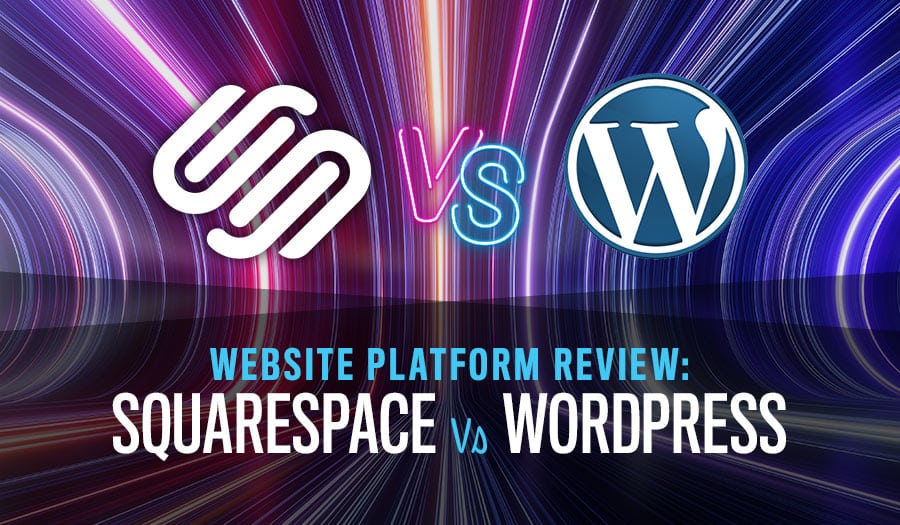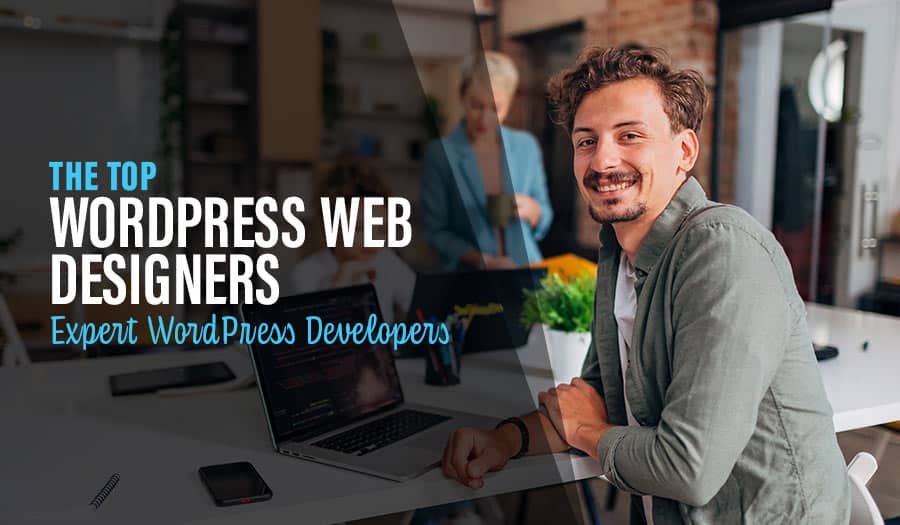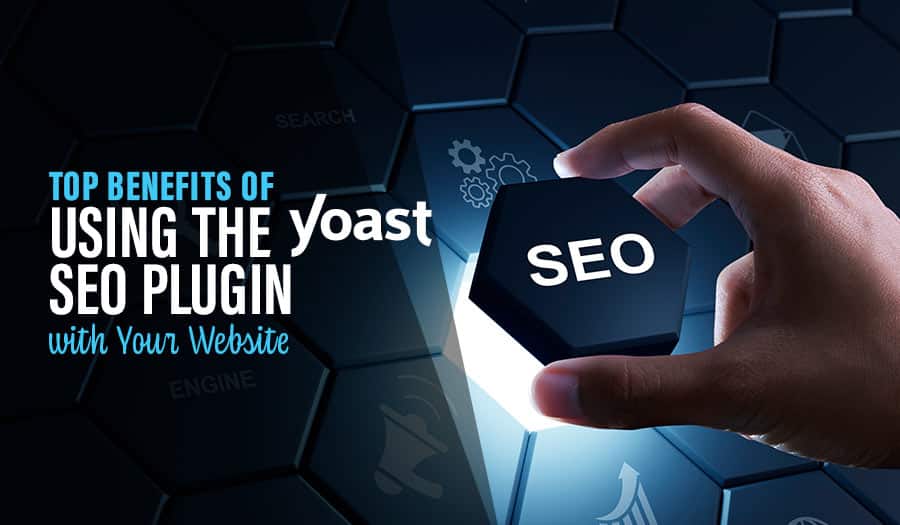Tech wars are all over, and you’re probably an avid spectator. There’s Android vs. iOS, Xbox vs. PlayStation and the Galaxy S- series versus the iPhone. Then there’s one you only hear about when creating websites: Squarespace vs. WordPress.
For starters, WordPress has been the go-to website design platform for two decades now. As of now, it now powers 33% of the web. Coming in at a distant fifth place is Squarespace. It is the alternative seeking to dethrone WordPress from its seat of internet glory by offering a slightly different approach.
What’s The Difference Between the Two?
Websites are becoming a staple for SMEs, large enterprises and individuals all the same. The rise of e-commerce, podcasts, YouTube careers, merchandise sales, and affiliate marketing was the perfect storm that brought websites to prominence.
Website platforms like WordPress and Squarespace exist for two reasons. One is the high demand for websites. The other is the reality that, to most people, HTML remains a foreign language.
These platforms allow you to build your website without having any prior coding experience or expertise.
Well, WordPress and Squarespace have a few differences, including:
Open Source vs. Closed Source
WordPress is a community-owned open-source software. With this software, you can utilise, tweak, study and share the existing code without writing it from scratch.
On the other hand, Squarespace is a privately owned closed-source software. In this case, you don’t have access to the Squarespace code and therefore can’t customise it.
SaaS vs. On-Premise
WordPress is an on-premise solution. To utilise WordPress, you first have to download it, and then install it on your computer to run it. Just like old times.
On the other hand, Squarespace operates on a modern Software as a Service (SaaS) platform. This web platform exists on the cloud, which you can access from your browser.
It’s pretty modern and suave until your internet connection fails.
What to Consider Before Choosing Either
There are many boxes to check in your list before arriving at the right solution for your website. Before you make that crucial decision, it’s important to consider:
Cost
Since every website project has a budget, pricing solutions are one of the most crucial things to consider before deciding.
WordPress
As open-source software, many people still market WordPress as a free solution. Well, it’s a grey area.
The fact that WordPress doesn’t charge you upfront doesn’t mean it’s free. Remember, you still have to pay for your annual domain name and registration.
Moreover, most of the services (plug-ins, themes, .etc.) people build around WordPress are commercial and not free.
Squarespace
Upfront, Squarespace is not free (wails in anguish). Just like Netflix, you get to pay for this software solution either yearly or monthly under the guise of monthly payment options. Squarespace payment options include:
- $12 for personal
- $18 for business
- $26 commerce basic
- $40 for commerce advanced
2. Features and Functionality
Both WordPress and Squarespace automate website design through a set of features, functionalities and interfaces. From the get-go, WordPress is a clear winner in terms of its wealth of features. Squarespace doesn’t even come close.
Word Press
Word Press has hundreds of widgets and readymade themes it uses to bring your websites to life. Think of a theme like the crust of your favourite pizza, it’s the foundation of your website.
It controls the layout, graphics appearance, and colours of your website. For themes, you either get them for free or pay a premium. Widgets, on the other hand, are cheese and toppings.
Using custom widgets, you can add functionalities like a call to action, your FAQ page, navigation, search bar and social media links and functionalities.
Squarespace
Squarespace keeps it simple with its collection of themes and templates. Unlike WordPress, the Squarespace templates are predesigned and not that customisable.
The same can be said for its themes, which have limited functionality. That said, if you’re someone who wants to tweak everything on your website, Squarespace probably isn’t right for you.
3. Integrations
If you own a website, you probably want it to have an Instagram marketing integration. But, come to think of it, you may also need a map, a YouTube video section and a sale section, and something else.
Eventually, you’ll realise that a website is a living thing, and even some of the integrations you may need are yet to be created. Both WordPress and Squarespace handle this differently.
WordPress Plugins
Right ahead of pizza, the WordPress plug-in feature is the best invention since sliced bread. They are third-party applications that allow you to add more functionality to your website.
If there’s a plug-in for adding videos-you can have it. If there’s one for analytics-go at it; what about the one for inbound marketing? It’s all yours. Your options are unlimited, and you can probably do almost anything you want.
Squarespace Extension
Squarespace allows third-party extensions, a functionality that is highly welcome but pales in comparison to what WordPress offers. Honestly, it’s the equivalent of comparing the play store to the Nokia Ovi store.
These third-party apps are limited, few, and lack the reputation and following favourite WordPress plug-ins that have been created over the years.
4. Who Owns and Controls Your Website
If you’ve been in software circles for a while, you’ve probably heard of buyer lock-in. Here, the software vendor intentionally makes you dependent on their systems.
Ownership for your blog and website may not be a concern now, but in a few years, when your blog is worth 10 million like the Huffington post or a billion like e-bay, it will.
In cases such as software design, where the themes, code and functionalities are not yours, lines blur, and website ownership becomes a concern.
WordPress
In WordPress, the issue of ownership is straightforward. You have ownership of 99% of the files that make up your website, and you can move at any time.
If that’s not enough, WordPress allows you to control almost any aspect of your website, including the actual code itself.
That said, buyer lock-in is pretty non-existent as far as this platform is concerned. So if you choose to pick up everything and set camp elsewhere, they won’t give you a hard time and will let you keep most of your website.
Squarespace
Squarespace is one of the better website design platforms in terms of ownership and control. However, ownership in Squarespace is not as straightforward as it is in WordPress.
Subsequently, you don’t get nearly as much control as you would with WordPress.
Squarespace gives you control over a lot of your website. However, there are aspects they would rather not let you control. Some of these aspects include product pages, folders, cover pages, album pages, video blocks and draft style changes.
5. Building Your E-commerce Site
The e-commerce revolution is here, and it’s here to stay. But, as we mentioned above, this phenomenon is no longer being fuelled by massive companies like Amazon.
There’s an army comprised of small companies using Google my business, freelancers, independent contractors and drop shippers with businesses that exist entirely on the internet.
How do these two platforms reach out to e-commerce companies?
WordPress Through WooCommerce
In terms of e-commerce, WordPress has a pretty simple answer. One word –plug-ins. In this case, the plug-in for e-commerce primarily associated with WordPress is WooCommerce, a phenomenon on its own.
And if that was enough customisation, even WordPress customisations come with their own optimisations. So if you wish to add an optimisation or start an e-commerce site on WordPress, rest assured there’s a plug-in out there to meet your every desire.
Squarespace commerce
Squarespace is not a huge fan of third-party applications. Hence they have their own in-built e-commerce theme. That alone makes it less customisable than WordPress, which takes a plug-in-based approach.
Their limited approach also spills and is most visible through their payment options. Sadly, you only get three, which are:
- Stripe
- Apple Pay
- PayPal
On the opposite spectrum, there is no blog long enough for the number of payment options WordPress allows you to access.
6. Learning Curve
The learning curve in these platforms is also crucial. Nobody wants to spend thousands of dollars training someone to use a platform that doesn’t require coding in the first place.
In this aspect, Squarespace is a clear winner. Its lack of customisation, widgets, themes and templates eventually create a straightforward process.
Whether this is a good thing or a bad thing is subjective. Think about it, a car without the reverse gear would probably be easier to drive, but who would want one?
Squarespace is Easy
Creating a program on Squarespace is pretty straightforward. It’s pretty much a beginner’s favourite, and you can have a website up and running a few minutes after logging in.
The celebration is, however, short-lived once you realise that Squarespace has a flat curve. As a result, the functionalities, widgets and themes your business gets on its first time will still be the same two years later.
WordPress is Becoming Easier
WordPress sacrificed simplicity for customisation. That said, it will take some time to learn WordPress, but each second will be worth it.
The best thing about WordPress is that its curve is dome-shaped. The functionalities, themes and plug-ins you have become complex as both your business and expertise grow.
And the best part? WordPress is getting easier. Nowadays:
- Hosts let you install WordPress with a single click
- Some hosts come with it pre-installed
Squarespace vs WordPress: The Verdict
This one is simple, WordPress gets to keep its throne a little bit longer. Even if you go for Squarespace due to its learning curve, you’ll be back to WordPress once your website grows and needs more functionality; it’s like postponing the inevitable.
Squarespace vs WordPress? That is Where We Come In
Pixel Fish is your one-stop shop for all things website design. We’ve spent the last decades helping businesses transform their websites and turn them into revenue generation machines.
We could the same for your website. For more information, contact us today and we will be more than willing to help.
Speak to the WordPress experts and take your business to the next level with a Pixel Fish Website.
Check out some of our latest Website Design projects.
Further Reading
5 Reasons to Customise Your Social Media Strategy for Every Channel
How to Use Instagram to Drive Website Traffic for your business
Twitter Vs Facebook Vs Instagram Vs LinkedIn: Which is Right for You?
Stripe vs PayPal: Pros and Cons. Which One Should you Choose?
How To Handle A Bad Google Review
Top 8 Advanced WordPress Features and Plugins to Beat Your Competition
How to Set Up A YouTube Channel For Your Business
Facebook Reviews vs LinkedIn Reviews vs Google My Business Reviews
What Essential WordPress Website Elements Are Missing from Your Website?
How to Choose the right Content Marketing Agency for your business
Custom WordPress Website vs Theme: Which Is Best?
Top 9 Benefits of WordPress Web Design: Opening up on Open Source



